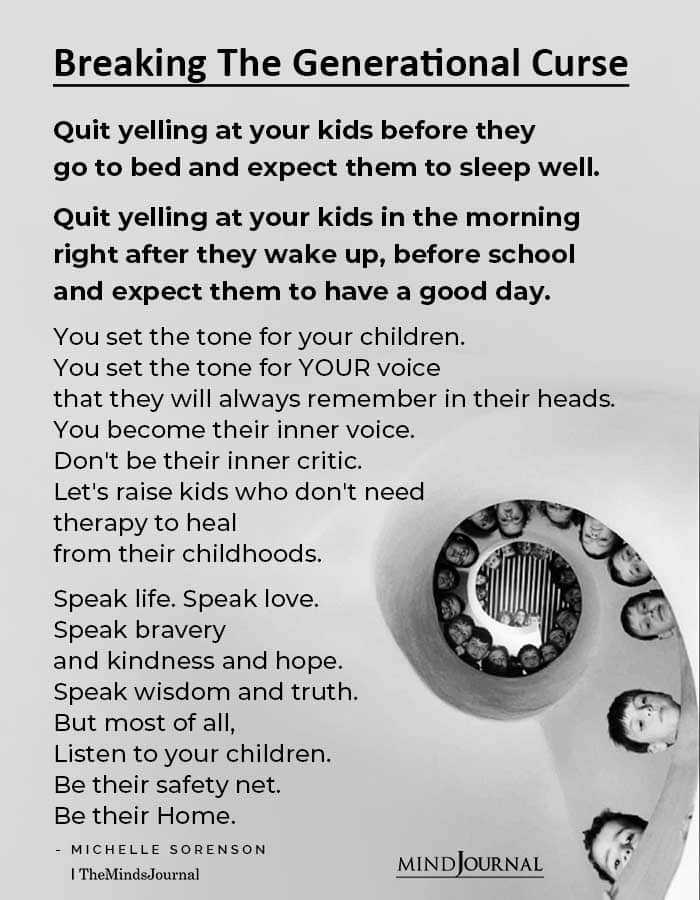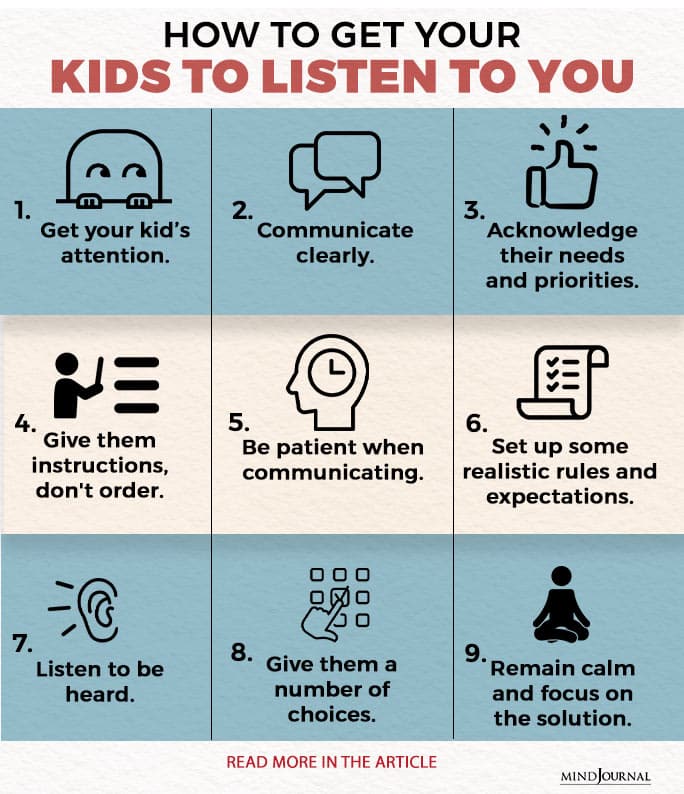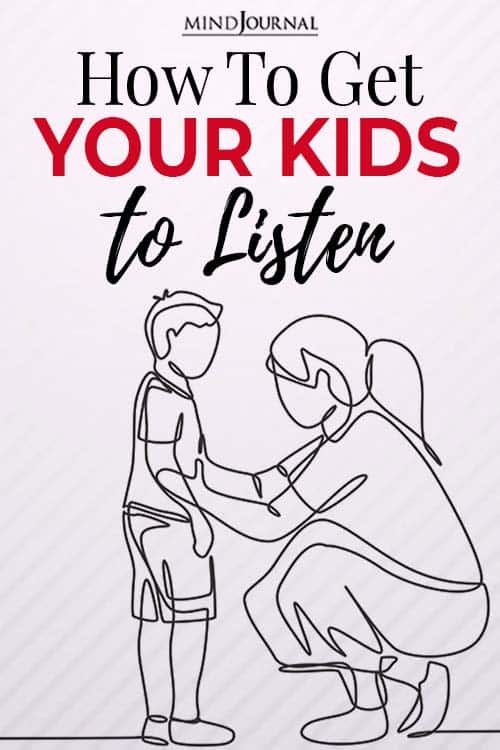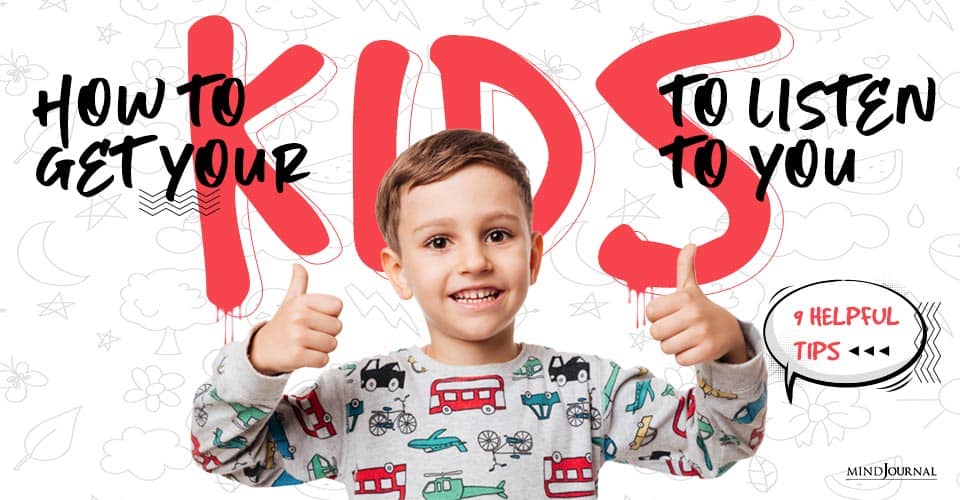Wondering how to make your children listen to you more? Listening is a crucial communication skill that most parents struggle to teach their kids. Here are a few ways that will help you to get your kids to listen.
Listening Shouldn’t Be A Power Struggle
Most parents find it challenging to make their kids listen to them and obey their words. Not only can they be defiant and refuse to follow your instructions, but it can also even turn into a power struggle. As parents start to become more authoritative and raise their voices to make their kids react to them, the task becomes even more daunting.
However, as parents, we need to understand that listening shouldn’t be a battle or a task. It is an essential communication tool that is important for healthy child development. We want our children not only to hear what we are saying but also to understand us and identify the emotions behind those words.
According to research, empathic communication is the key to successful interaction with your children. Empathy enables us to consider the impact of how we are communicating and what we are saying on our children. When we are aware of our own communication patterns, we will be better able to connect with our children and help to build their listening skills.
Related: 8 Ways To Slow Down and Connect With Your Children At Home
How Parents Speak Matters
According to a 2013 study, the way we speak to our kids can significantly influence their learning & communication abilities. The study states “Our results reveal that caregiver talk has direct as well as indirect influences on lexical development.” Parents teach their children how they should talk, behave and act.
And the way we talk directly influences their development. It affects whether they listen to us or not and how they respond & react to what we say. When we communicate in an aggressive manner, it compels children to behave in aggressive ways, like yelling back, acting out, ignoring their parents, or even being afraid. “
More exposure to child-directed speech not only provides more models for learning words but also sharpens infants’ emerging lexical processing skills, with cascading benefits for vocabulary learning,” adds the study.
But when parents speak in a softer, more passive manner using cautious words, this can make children ignore them. As parents become annoyed, they turn to aggression which can influence their kids’ mental health in the long run.

“Communication with children and adolescents is an area that requires special attention,” explains a 2016 study. This is why it is important that parents are assertive yet empathic in their communication in order to develop the right listening skills in their children. Being assertive can enable you to be clear, firm, confident, consistent yet warm, and positive.
Being empathic and assertive is the most effective way to make your children listen to you, understand you. It also helps you to listen to them as well. A 2006 study explains “Children learn more from what they see, modeled than from lectures. Parents of argumentative children often fail to see that the children are just mirroring their behavior.”
Related: 4 Mentally Damaging Things We Say To Kids All The Time
How To Boost Your Kid’s Listening Skills

If you are still wondering how to get your children to listen to you consistently while maintaining a positive flow of communication, then here are a few effective tips that can help you get started.
1. Get your kid’s attention
Shouting at your kids from across the room will not get the job done and most parents are aware of this. If you want them to listen, then you need to make them pay attention to you.
Instead of shouting orders, walk up to them, be at their physical level, make eye contact, create warm physical contact, and build a connection before you speak. Understand what they are doing, ask them to pay attention, get rid of all distractions, and tell them what you need to. Once you are made your point, you also need to listen to their response and acknowledge that as well.
Related: 7 Simple Ways You Can Motivate Kids To Get Things Done
2. Communicate clearly
Make sure to be precise when talking to your children. When you speak in a vague and unclear manner, kids can feel confused about your instructions. So to avoid unnecessary overcomplication, keep your sentences simple, short, and to the point.
It is also important that you do not speak too much, give too many instructions or repeat yourself constantly in case they are not paying attention or listening to you. Repetition can make your kids think that they are allowed to avoid your words as you will repeat them. In case they are not paying attention, focus on gaining your kid’s attention first.
3. Understand their perspective
Children often don’t ignore their parents intentionally. Kids below the age of 14 tend to have low peripheral awareness that can make them distracted easily. Hence, they are often unable to focus or understand the activities occurring in their environment.
So before you start talking to them, ensure that they are not engaged in any activities, like reading, playing, or watching TV. It is highly likely that they may not have heard you even if you are near them.
In such cases, you may repeat yourself once you have gained their undivided attention. Moreover, you also need to acknowledge and accommodate their needs and priorities, just as they need to acknowledge yours.
Related: The Reason For Sudden Behavioral and Personality Changes in Kids
4. Inform and instruct, don’t ask or order
Listening is a skill that you need to teach your children with patience and practice. The objective of communicating with your children is to make them understand and obey your instructions.
So rather than asking them to do what you want or ordering them around, you need to focus on giving them instructions. Moreover, it is also crucial that you help them understand exactly why they need to listen to you and why a task is required to be done. It is also important that you are kind and warm while instructing them.
5. Be patient
Children do not act and behave as adults do, they may require more time to process information than you do. Listening to you is not enough, you also need them to understand you.
So you need to be patient when communicating with kids and allow them the necessary time to process the instruction and obey it. You also need to check if they need any help or support from you to do the task and if needed repeat the instructions so that they may understand without any confusion. You may also choose to break down the instructions into simpler words and tasks to make it easier for them.
Related: 4 Things You Can Do To Keep Your Kids Encouraged And Inspired
6. Set rules, routines and expectations
Instead of nagging, set up some crucial rules and routines to make sure that your kids comply with your instructions. If you want your children to listen to you then you need to stop ordering or criticizing them and instead set up strict routines.
Not only this will reduce power struggles, but it will also help them build helpful habits like picking up their toys, brushing teeth, etc. Moreover, you can also schedule playtime as a reward for following routines which they can enjoy after the completion of a certain task.
However, you also need to have realistic expectations from your kids and realize that they are just that…kids!
7. Listen to be heard

Listening is a two-way street when it comes to parent-child communication. If you are distracted or glued to your smartphone while your child shares something important to them or asks something from you, then your behavior will have a direct impact on how they react and respond to you.
When you pay attention to your child and actively listen to them, then you will encourage them to do the same. This can further help to improve your relationships and connect with your kids as they grow older.
Related: The Dangers of Distracted Parenting: Why Parents Need To Put Down Their Phones
8. Provide options
Giving a number of choices to your child, instead of simply ordering them around, will increase the likelihood of them listening to you. This will give them the illusion that they are in control of what activity they engage in and what their behavior should be. So make sure to give enough options to your kids when communicating.
9. Remain calm
Dealing with kids can be challenging and making sure that they are listening to you can really make most parents feel frustrated, to say the least. However, the more aggressive behavior you exhibit and the more you command them, the more defiant your children will be.
Moreover, it can also affect your connection and relationship with them in the long run. The first thing you need to realize is that your kids may not do everything exactly the way you want them to.
Instead of getting frustrated and shouting at them, stay calm even things become chaotic. By remaining calm you will set a great example for your kids. Just remember to breathe deeply and help them do what you need them to. Instead of playing the blame game, focus more on the solution.
Related: 3 Do’s and Don’ts for Raising Emotionally Intelligent Kids
Be A Parent, Not A Dictator

No one likes to be bossed around. The best way to make sure your kids listen to you is to be encouraging, warm, empathic, and positive. Focus more on building a strong emotional connection with them instead of making them dance to your tunes. When they feel loved and heard, they will hear you too.
Using positive reinforcement and positive statements will encourage them to oblige instead of being defiant. Once you understand the basics of parent-child communication and strengthen your relationship, they will be listening to you willingly and will want to please you.
Related: 5 Things Parents Do Who Raise Good Kids: Harvard Psychologists













Leave a Reply